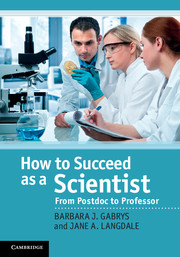Book contents
- Frontmatter
- Contents
- Preface
- Acknowledgements
- Part I Becoming an independent researcher
- 1 Managing your time
- 2 Giving a good research talk
- 3 Writing a quality research paper
- 4 Handling scientific criticism
- 5 Writing grant applications
- 6 Tools for managing research projects
- 7 Is there life beyond academia?
- 8 Applying for a job in academia
- 9 Applying for an independent research fellowship
- Part II Thriving in your new job
- Part III Managing your career
- Index
- References
7 - Is there life beyond academia?
from Part I - Becoming an independent researcher
Published online by Cambridge University Press: 05 November 2011
- Frontmatter
- Contents
- Preface
- Acknowledgements
- Part I Becoming an independent researcher
- 1 Managing your time
- 2 Giving a good research talk
- 3 Writing a quality research paper
- 4 Handling scientific criticism
- 5 Writing grant applications
- 6 Tools for managing research projects
- 7 Is there life beyond academia?
- 8 Applying for a job in academia
- 9 Applying for an independent research fellowship
- Part II Thriving in your new job
- Part III Managing your career
- Index
- References
Summary
In most HE institutions, a lectureship/assistant professorship, whether permanent or fixed-term, is the first step on the career ladder to a professorship. Before applying for such a position, it is therefore important to ask yourself whether an academic job is what you really want. What skills have you acquired that would ensure success outside academia? What else is out there that can be challenging and rewarding? Are you better suited to eventually managing a multi-million-pound corporation or running a charity? Would you be happier as a senior partner in a patent office, as head of research in a governmental institution or as a senior administrator in a university? We explore different options and give examples of very successful people who left academia to make their mark elsewhere.
The theory
It is obvious that the number of people with higher degrees far exceed the number of places available in academia. It is also obvious that academia is not the best career choice for everyone. For example, if you are a great researcher but do not enjoy teaching, then academia is not the place for you. However, your scientific skills – such as analytical reasoning, ability to solve problems in an unorthodox way (thinking outside the box), to communicate to a wide audience and to synthesise diverse sources of information – open many avenues for you.
Before deciding on a career path you will need to think carefully about your principles and priorities (see Chapter 1) and to gather information from several sources. There are many alternative careers in science and most universities organise careers meetings where non-academics talk to postdocs about their own career trajectories following a science PhD and postdoc. Even better, if you know a scientist working outside academia – talk to him or her – what have they done since being a postdoc or PhD student, what excited and inspired them and what frustrated them? You will also need to assess your own skills – most universities have a Careers Service or Human Resources office that can help you do this.
Information
- Type
- Chapter
- Information
- How to Succeed as a ScientistFrom Postdoc to Professor, pp. 68 - 80Publisher: Cambridge University PressPrint publication year: 2011
